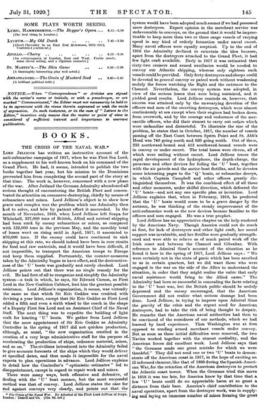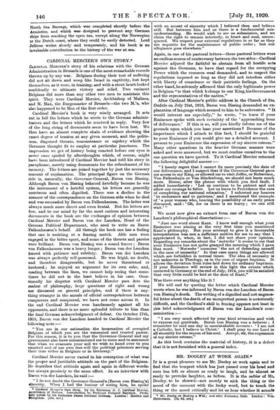BOOKS.
THE CRISIS OF THE NAVAL WAR.*
LORD JELLICOE has written an instructive account of the anti-submarine campaign of 1917, when he was First Sea Lord, as a supplement to his well-known book on his command of the Grand Fleet. He had, it seems, intended to publish the two books together last year, but his mission to the Dominions prevented him from completing the second part of the story at that time. The work is, however, concerned with a new phase of the war. After Jutland the German Admiralty abandoned all serious thought of encountering the British Fleet and concen- trated its attention on commerce-destroying, chiefly by means of submarines and mines. Lord Jellicoe's object is to show how grave and complex was the problem which our Admiralty then had to solve, and hOw by patient effort it succeeded. In the month of November, 1916, when Lord Jellicoe left Scapa for Whitehall, 327,000 tons of British, Allied and neutral shipping had been sunk by enemy submarines or mines, as compared with 122,000 tons in the previous May, and the monthly total of losses went on rising until in April, 1917, it amounted to 870,000 tons. If the enemy could have continued to sink shipping at this rate, we should indeed have been in sore straits for food and raw materials, and it would have been difficult, if not impossible, to transport the American troops to Europe and keep them supplied. Fortunately, the counter-measures taken by the Admiralty began to have effect, and the destructive- ness of the ' U' boats was gradually and surely checked. Lord Jellicoe points out that there was no single remedy for the evil. He had first of all to reorganize and simplify the Admiralty system—a task in which, he says, Sir Edward Carson, as First Lord in the New Coalition Cabinet, lent him the greatest possible assistance. Lonl Jellicoe's organization, it seems, was virtually the same as that which Sir Eric Geddes was credited with devising a year later, except that Sir Eric Geddes as First Lord added a fifth and even a sixth wheel to the coach in the shape of a Deputy First Sea Lord and an Assistant Chief of the Naval Staff. The next thing was to expedite the building of light craft for hunting U ' boats. We gather from Lord Jellicoe that the mere appointment of Sir Eric Geddes as Admiralty Controller in the spring of 1917 did not quicken production, although, as usual, " the new organization resulted in the creation of a very large administrative staff for the purpose of. accelerating the production of ships, ordnance material, mines, and so on." The civilians introduced- into the Admiralty failed to give accurate forecasts of the ships which they would deliver at specified dates, and thus made it impossible for the naval experts to plan operations in advance. Lord Jellicoe explains in detail how the Controller's " optimistic - estimates " led to disappointment, except in regard to repair work and mines.
There were many ways, both offensive and defensive, of dealing with the ' U' boat menace, but the most successful method was that of convoy. Lord Jellicoe states the case for and against convoys very clearly, and points out that the
• TAe Crisis of the Naval War. By Admiral of the Fleet Lord Jellicoe of Scapa. London Cassell and Co. [31s. isd. net.] system would have been adopted much sooner if we had possessed more destroyers. Expert opinion in the merchant service was unfavourable to convoys, on the ground that it would be imprac- ticable to keep more than two or three cargo vessels of varying speed in any kind of orderly formation under naval escort. Many naval officers were equally sceptical. Up to the end of 1916 the Admiralty declined to entertain the idea because, apart from the destrgers attached to the Grand Fleet, it had few light craft available. Early in 1917 it was estimated that sixty-two cruisers and armed auxiliaries would be needed to convoy our Atlantic shipping, whereas only eighteen such vessels could be provided. Only forty destroyers and sloops could be devoted to general convoy or patrol work without weakening unduly the forces watching the Bight and the entrance to the Channel. Nevertheless, the convoy system was adopted, in view of the serious losses that were being sustained, and it yielded good results. Lord Jellicoe reminds us, however, that success was attained only by the unwearying devotion of the officers and men• of the escorting destroyers, which were almost continuously at sea except when their engines had broken down from overwork, and by the courage and endurance of the mer- cantile officers, who did their utmost to carry out orders which were unfamiliar and distasteful. To illustrate the size of the problem, he states that in October, 1917, the number of vessels passing off the East Coast between Spum Point and St. Abb's Head was 740 going north and 920 going south. Out of these, 233 northward-bound and 413 southward-bound vessels were in convoy or under escort. The total losses were eleven, all of which were sailing without escort. Lord Jellicoe traces the rapid development of the hydrophone, the depth-charge, the paravane and other devices for foiling the ' U' boat, together with the air patrols and the motor-boat flotillas, and he devotes some interesting pages to the ' Q' boats, or submarine decoys, in which Captain Campbell and other officers greatly dis- tinguished themselves. It was the combined effect of all these and other measures, under skilful direction, which defeated the
U ' boats—and not any one specific plan or invention. Lord Jellicoe explains that, when in February, 1918, he predicted that the ' U ' boats would cease to be a grave danger by the autumn, he was thinking of the steady improvement of the anti-submarine work as the new devices became familiar to the officers and men engaged. He was a true prophet.
Lord Jellicoe has an appreciative chapter on the help rendered by the American Navy. Though America could not do much at first, for lack of destroyers and. other light craft, her moral support was invaluable, and her flotillas were gradually strength- ened and were able to relieve us of much patrol work off the Irish coast and between the Channel and Gibraltar. With reference to Admiral Sims's account of the situation as he found it here in the spring of 1917, Lord Jellicoe says : " We were certainly not in the state of panic which has been ascribed to us in certain quarters, but we did want those who were engaged in the war on the side of the Allies to understand the situation, in order that they might realize the value that early naval assistance would bring to the Allied cause." The Admiralty had been so successful in concealing the facts relating to the ' U' boat war, lest the British public should be unduly depressed and the enemy encouraged, that the American Government did not realize what serious damage had been done. Lord Jellicoe, in trying to impress upon Admiral Sims the gravity of the crisis and the urgent need for American destroyers, had to take the risk of being thought to despair. He remarks that the American naval authorities had then to be convinced of the soundness of our methods, which we had learned by hard experience. Thus Washington was at first opposed to sending armed merchant vessels under convoy. But as soon as these initial difficulties were removed, the two Navies worked together with the utmost cordiality, and the American forces did excellent work. Lord Jellicoe says that " the Germans made one great mistake for which we were thankful." They did not send one or two ' U ' boats to demon- strate off the American coast in 1917, in the hope of exciting an ill-informed clamour, like that of 1898 during the Spanish-Ameri- can War, for the retention of the American destroyers to protect the Atlantic coast towns. When the Germans tried this move in 1918 it was too late, for America knew by that time that a few ' U ' boats could do no appreciable harm at so great a distance from their base. America's chief contribution to the naval operations, apart from the destroyer work, was in supply- ing and laying an immense number of mines forming the great
North Sea Barrage, which -was completed shortly before the Armistice, and which was - designed to prevent any . German ships from reaching the open sea, •except along' the Norwegian or the Dutch coast, where they could be- easily detected. Lord delliooe writes clearly and temperately, -and his book •is an invaluable contribution to the history of the war at sea.



































 Previous page
Previous page